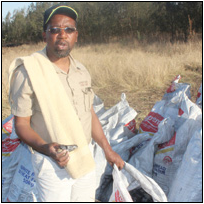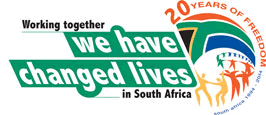Babanango is a land where the river fl ows, the birds sing and the mountains are green. Many have dubbed this place, nestled in Zululand, in the north of KwaZulu-Natal, little heaven.
 But all this majestic beauty is bittersweet because of the painful memory of how, in the 1950s, 192 families had to leave this land behind as part of apartheid’s forced removals.
But all this majestic beauty is bittersweet because of the painful memory of how, in the 1950s, 192 families had to leave this land behind as part of apartheid’s forced removals.
In 1997, these families, under the banner of the Emcakwini Community Trust, lodged a claim to get their land back.
Ten years later the land was handed over to the trust and the people of Babanango put the land to work, says the trust’s chairperson Eric Buthelezi.
“The community has now turned pain into prosperity by making sure that the 19 000 hectares of land is used to improve the community,” he adds.
According to Buthelezi, the trust had initially claimed 38 000 hectares of land but was granted 19 000.
The trust’s beneficiaries decided to make the most of the land and have set up lucrative, sustainable businesses such as farming, forestry, charcoal manufacturing and sew milling.
“All this comes with much hard work, determination and having a vision,” Buthelezi points out.
With all these businesses, the trust is the leading employer in Babanango, employing about 160 people from the community.
“Claiming land back is difficult but what is even more difficult is making use of that land and running a successful business. Numerous communities around South Africa receive land but aren’t able to use it to its full potential,” he explains.
Buthelezi worked at a museum in Pretoria but quit his job to focus on the trust and its land because he saw much potential there.
“I always wanted to become a farmer and to develop the land where I grew up.
“I did not want to see young people of this area leaving for urban areas seeking employment. I wanted the trust to be our bread and butter.”
When the trust received the land, most of the wattle, gum and pine trees on it were damaged.
“We decided to take the damaged trees and turn them into coal. This helped bring cash fl ow into our business and also made way to plant new trees where the damaged ones were.”
This gave birth to the trust’s charcoal business in 2008. To kick things off, the trust bought charcoal ovens needed to make charcoal.
The charcoal business employs about 24 people.
The process begins with cutting of trees, which are then placed in a charcoal oven for about 12 hours. After two days about 350 to 400 bags of charcoal are produced.
“We sell the charcoal to a company called Coastal Fires in Stanger. The agreement is to supply them as for as long as we can,” Buthelezi says.
The trust received R5 million from the National Development Agency (NDA) for their charcoal business.
The trust also produces crop and recently harvested 500 hectares of vegetables such as mealies and beans, which brought 20 employment opportunities.
In addition, there are two lodges on the land, one of which is operational.
“The owner of the Babanango Guest Lodges pays occupational rent to the trust and employs about 40 people. Our land is also rich in game. We have zebras, buck and impala which serve as a tourist attraction.”
The trust also has a sew milling plant, which produces beams used in houses. These beams are made from the trees on the land.
“The plant employs about 15 people from the community. We started this business last year and it’s doing very well,” says Buthelezi. He is hopeful that in the future land currently not in use will also be profitable.
“One day we hope to have a golf course, a spa as we have a spring fl owing from the Umfolozi River.”
Buthelezi’s ultimate aim is for the young people of Babanango to benefit from the trust’s initiatives.
“I want to step down eventually and see the young people of this land running the different businesses and seeing them prosper,” he adds.
Emcakwini Community Trust’s success is a testament to what South Africans, who have been victims of injustices in the past, can achieve under a democratic government.

- Since the start of the land restitution programme in 1995, 79 696 claims have been lodged.
- 77 334 of these claims have been settled.
- By the end of March this year, 4 860 farms had been transferred to black people and communities through the redistribution programme.
- About 250 000 people – more than 50 000 women, 32 000 youth and 674 persons with disabilities – have benefitted through land reform.



 Facebook
Facebook Twitter
Twitter WhatsApp
WhatsApp